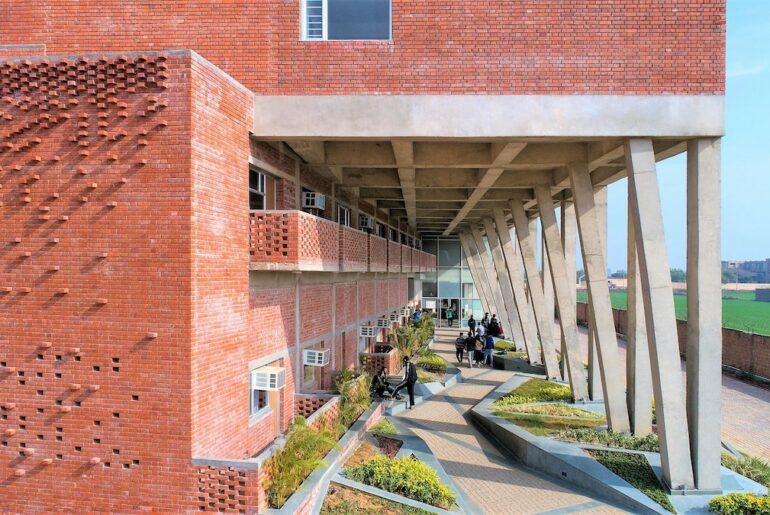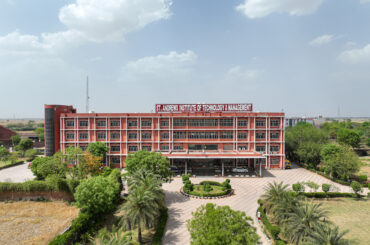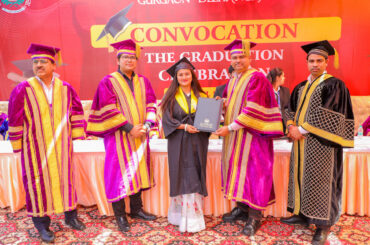MBA Colleges in India
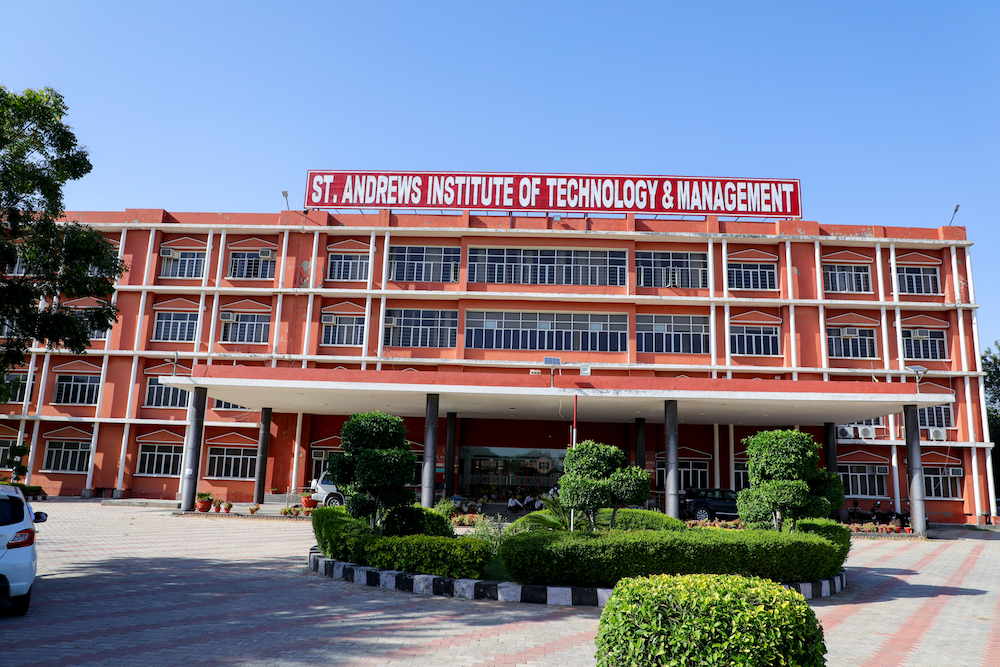
IMAGE 1 – SAITM College
An MBA, or Master of Business Administration, is a prestigious postgraduate degree offered by MBA colleges that equips students with both theoretical and practical training in business management.
The curriculum typically includes subjects like finance, marketing, operations, strategy, organizational behaviour, and entrepreneurship, providing a comprehensive foundation in business principles.
India is home to a wide range of MBA colleges known for their quality education, strong alumni networks, and excellent placement records.
Here’s an overview of some of the top MBA colleges in India across various categories:
Indian Institute of Management (IIMs)
They provide a range of programs, with the flagship being the two-year Post Graduate Programme in Management (PGP).
St. Andrews Institute of Technology and Management (SAITM)

IMAGE 2 – SAITM A Block
St. Andrews Institute of Technology and Management (SAITM) offers a Master of Business Administration (MBA) program aimed at providing students with a comprehensive understanding of business management principles and practices.
Faculty of Management Studies (FMS), University of Delhi
FMS Delhi, operated by the University of Delhi, stands as one of India’s oldest and most esteemed business management institutes. It provides a diverse array of programs, offering MBA specializations in various fields.
Department of Management Studies (DMS), Indian Institutes of Technology (IITs)–
Several IITs have their own management departments offering MBA programs. DMS at IIT Delhi and DMS at IIT Madras are among the prominent ones.
Jamnalal Bajaj Institute of Management Studies (JBIMS), Mumbai
JBIMS is a renowned government management institute affiliated with the University of Mumbai. It offers various management programs, including a Master of Management Studies (MMS) degree.
Institute of Rural Management Anand (IRMA)
IRMA, located in Anand, Gujarat, is an autonomous institution recognized by the Government of India. It specializes in rural management and offers a Post Graduate Diploma in Rural Management (PGDRM).
National Institute of Industrial Engineering (NITIE), Mumbai:
NITIE is an autonomous institute under the Ministry of Education, Government of India. It offers various postgraduate and doctoral programs in industrial and management engineering.
Some of the most opted courses in India and St. Andrews college or different Engineering college or Management colleges are as follows:-
- Btech
- Btech CSE
- Btech ETCE
- MTech
- BCA
- BBA
- MBA
- MCA
- DPharma – St. Andrews College of Pharmacy
- BPharma – St. Andrews College of Pharmacy
- BArch – St. Andrews College of Architecture
Admission Process in Top MBA Colleges in India
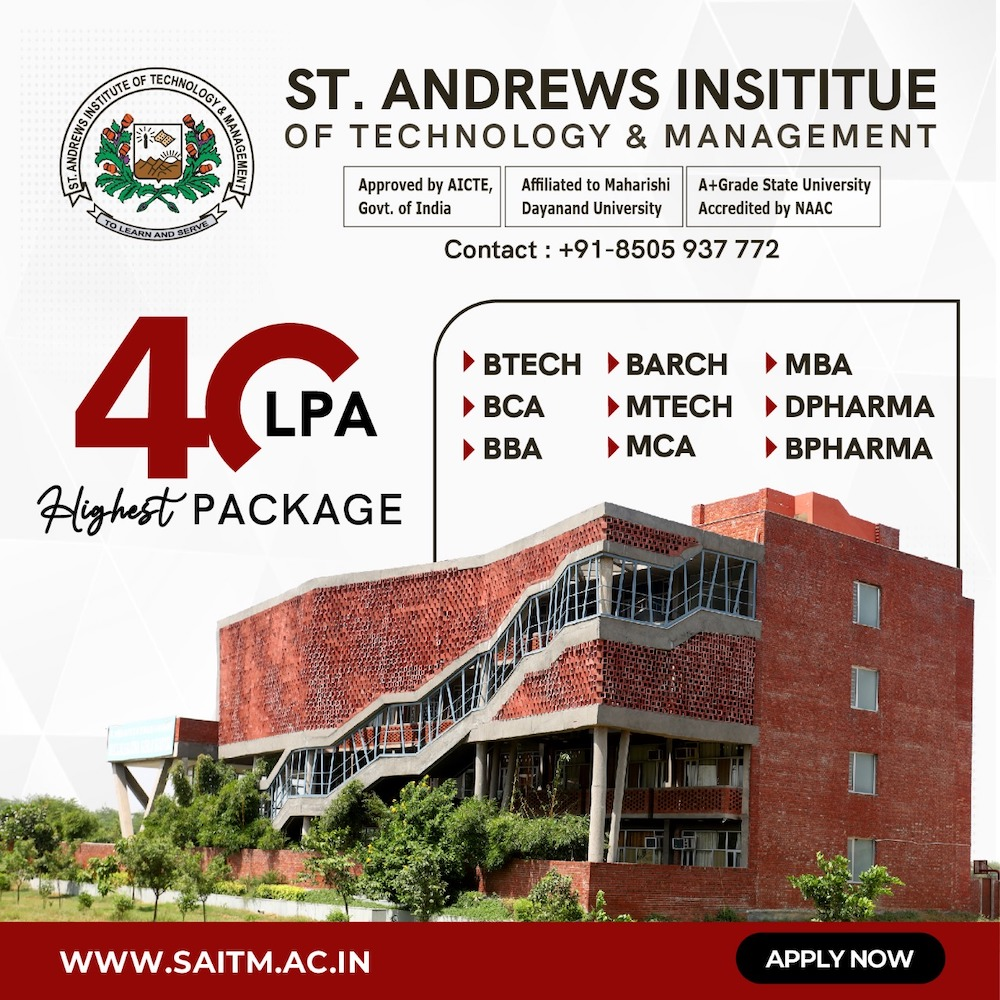
IMAGE 3 – Courses Overview
The admission process for top MBA colleges in India can vary slightly from one institution to another, but there are some common steps involved.
Here’s a general overview of the typical admission process:
Entrance Exams
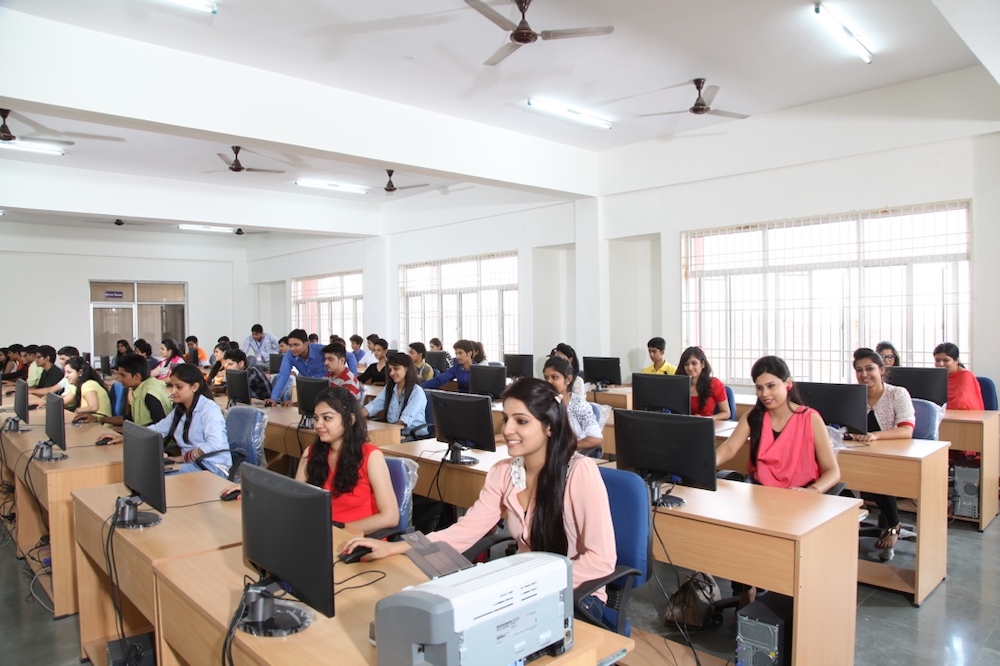
IMAGE 4 – Top Entrance Exam for Admission
Many top MBA colleges in India require candidates to appear for national or state-level entrance exams. The most common entrance exams for MBA admissions in India include CAT (Common Admission Test), MAT (Management Aptitude Test), XAT (Xavier Aptitude Test), CMAT (Common Management Admission Test), among others. Each exam may have its own eligibility criteria and test structure.
Application Form

IMAGE 5 – Planning Career Path
Candidates need to fill out the application form for the MBA specialization of their choice. This usually involves providing personal details, educational qualifications, work experience (if applicable), and other relevant information. The application form may be available online on the college or university website.
Entrance Exam Scores

IMAGE 6 – Importance of Entrance Exam’s Score
Candidates are required to submit their scores from the relevant entrance exam(s) along with their application form. The cutoff scores for admission may vary depending on the college and the program.
Group Discussion (GD) and Personal Interview (PI)
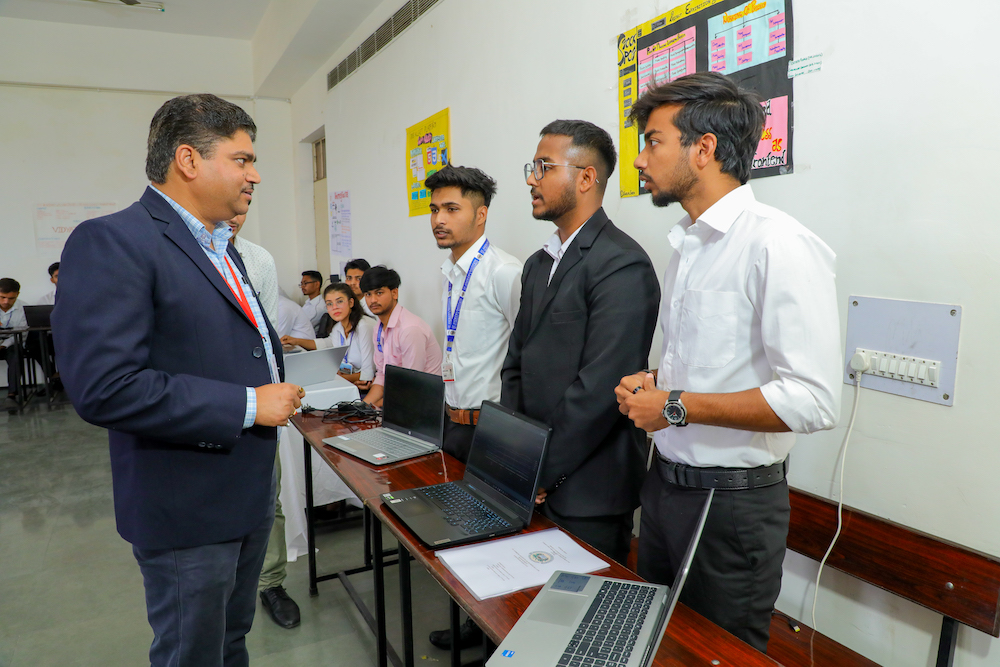
IMAGE 7 – Project Exhibition at SAITM College
Shortlisted candidates are often called for a group discussion and/or personal interview as part of the selection process. GD and PI sessions are conducted to assess candidates’ communication skills, leadership potential, problem-solving abilities, and overall suitability for the MBA degree.
Academic Background and Work Experience
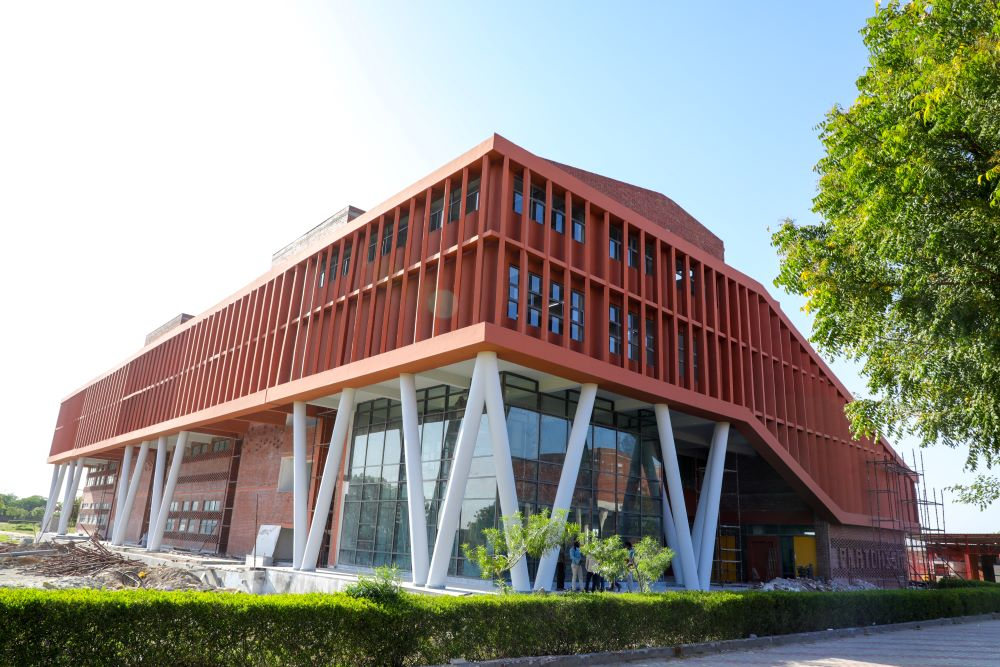
IMAGE 8 – SAITM College New Building
Top MBA colleges in India may also consider candidates’ academic performance in undergraduate studies, as well as any relevant work experience, during the selection process. Some top MBA colleges in India give weightage to factors such as diversity, extracurricular activities, and achievements.
Final Selection

IMAGE 9 – Final Selection
Based on the performance in entrance exams, GD/PI rounds, academic background, work experience, and other relevant criteria, top MBA colleges in India prepare a final merit list of selected candidates.
Admission Confirmation

IMAGE 10 – Analyzing Best for Industry
Candidates who receive admission offers need to confirm their acceptance by paying the admission fee within the stipulated time frame.
Eligibility Criteria of Top MBA Colleges in India
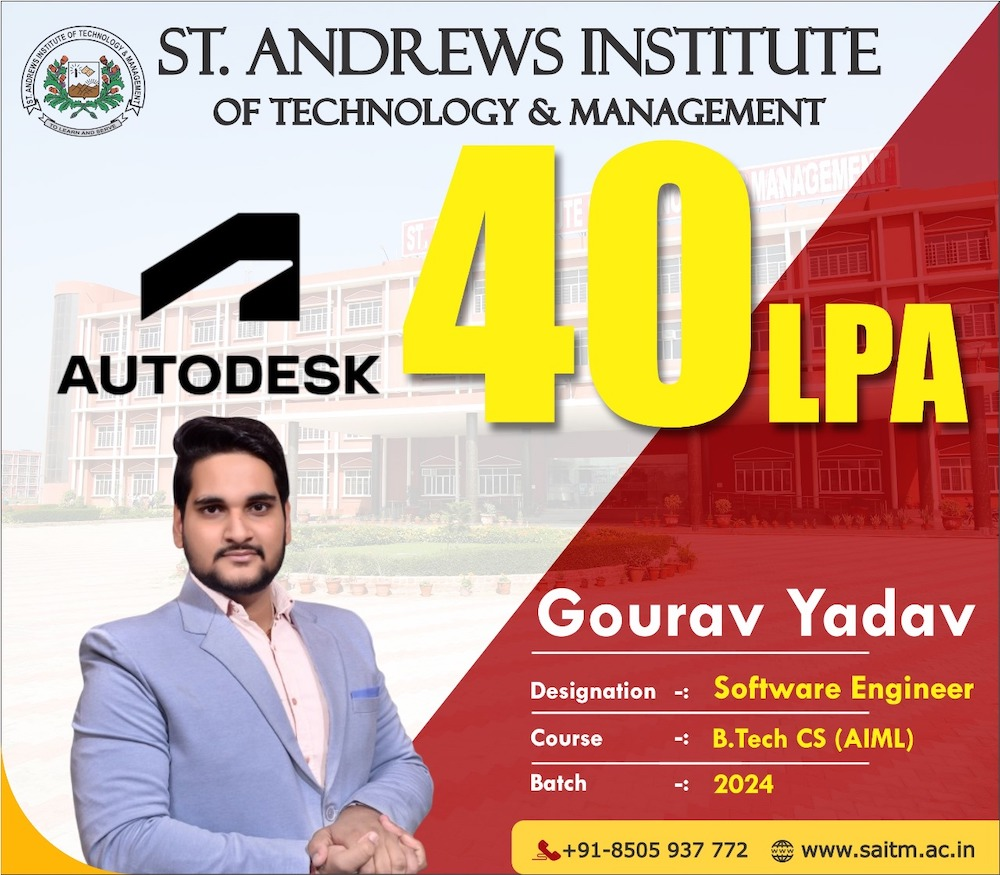
IMAGE 11 – Higher Package
The eligibility criteria for admission to the top MBA colleges in India may vary slightly from one institution to another.
However, here’s a general overview of the typical eligibility criteria:
Educational Qualifications:

IMAGE 12 – Meeting to Make Industry Ready Students
Candidates must have completed a bachelor’s degree in any discipline from a recognized university or institution.
The minimum duration of the bachelor’s degree program is usually three years, although some top MBA colleges in India may accept candidates with a four-year degree as well.
A minimum aggregate score in the bachelor’s degree program is often required, which may vary depending on the college. Typically, candidates need to have a score of at least 50% to 60% in their undergraduate studies. Some top MBA colleges in India may have specific subject-wise requirements as well.
Entrance Exam Scores:

IMAGE 13 – Analyzing Industry Growth
Candidates are required to appear for national or state-level entrance exams such as CAT (Common Admission Test), XAT (Xavier Aptitude Test), MAT (Management Aptitude Test), CMAT (Common Management Admission Test),or others as specified by the respective MBA colleges in India.
Top MBA colleges in India consider the candidate’s score in the entrance exam as a significant factor in the admission process. The cutoff scores for admission may vary from one college to another and may also differ for different categories of candidates (such as general, OBC, SC, ST, etc.).
Work Experience (if applicable):

IMAGE 14 – Make Students Knowledgable About Time Importance
While work experience is not mandatory for admission to most MBA programs, many top B-schools in India prefer candidates with some prior work experience.
Some top MBA colleges in India may specify a minimum duration of work experience (typically ranging from 1 to 2 years), while others may consider any relevant work experience as an added advantage during the selection process.
Other Criteria:

IMAGE 15 – Collecting All Factor That Can Help Career Growth
Some best MBA colleges in India may have specific eligibility criteria related to age, nationality, and domicile status.
Additionally, candidates may be required to fulfill certain prerequisites such as appearing for group discussions (GD), personal interviews (PI), and written ability tests (WAT) as part of the selection process.
Best MBA Colleges in India with Fee Structure

IMAGE 16 – SAITM B Block
Here are the best MBA colleges in India along with an approximate fee structure:
Indian Institute of Management (IIMs)
Fee Structure: The fee for the two-year MBA degree at Indian Institute of Management varies between INR10 lakhs to INR 25 lakhs, depending on the institute. Some institutes of Indian Institute of Management also have different fee structures for Indian and international students.
St. Andrews Institute of Technology and Management (SAITM)
The fee for the two-year MBA degree at SAITM is INR 2.6 lakhs.
Indian School of Business (ISB), Hyderabad:
Fee Structure: The fee for the one-year MBA degree at ISB is approximately INR 40 lakhs.
Xavier School of Management (XLRI), Jamshedpur:
Fee Structure: The fee for the two-year MBA degree at XLRI is approximately INR 20 lakhs.
Faculty of Management Studies (FMS), University of Delhi:
Fee Structure: The fee for the two-year MBA degree at FMS Delhi is relatively low compared to other top B-schools and is approximately INR 1 lakh for the entire course.
Management Development Institute (MDI), Gurgaon:
Fee Structure: The fee for the two-year MBA degree at MDI Gurgaon is approximately ₹22 lakhs.
International Management Institute (IMI), New Delhi:
Fee Structure: The fee for the two-year MBA degree at IMI New Delhi is approximately INR 17 lakhs.
MBA Entrance Exams Accepted by Top MBA Colleges in India

IMAGE 17 – Management Block of SAITM
In India, several entrance exams are conducted for admission to MBA offered by various Business School and universities.
Here are some of the top MBA entrance exams in India:
Common Admission Test (CAT)
CAT is one of the most prestigious and competitive MBA entrance exams in India. It is conducted annually by the Indian Institute of Management (IIMs) and is accepted by numerous other top-tier management institutes across the country.
Xavier Aptitude Test (XAT)
XAT is conducted by XLRI Jamshedpur on behalf of Xavier Association of Management Institutes (XAMI). It is accepted by more than 150 B-schools in India and is known for its unique exam pattern, which includes sections on Decision Making and Essay Writing along with traditional sections.
Management Aptitude Test (MAT)
MAT is a national-level entrance exam administered by the All India Management Association (AIMA) for admission to various management programs in different B-schools across India. It is conducted four times a year (February, May, September, and December) in both paper-based and computer-based modes.
Common Management Admission Test (CMAT)
CMAT is a national-level entrance exam organized by the National Testing Agency (NTA) for admissions to programs in AICTE-approved institutions across India. It occurs annually in January.
NMAT by GMAC
NMAT, overseen by the Graduate Management Admission Council (GMAC), is conducted for admissions to various programs offered by NMIMS Mumbai and other prominent business schools in India. The test takes place over a testing window spanning from October to December.
Indian Institute of Foreign Trade (IIFT) Entrance Exam
IIFT administers its own entrance exam for admission to its MBA course offered at its campuses in Delhi, Kolkata, and Kakinada.
Maharashtra Common Entrance Test (MAH-CET)
MAH-CET is conducted by the State Common Entrance Test Cell, Maharashtra, for admission to MBA course offered by various MBA colleges in the state of Maharashtra.
MBA Syllabus
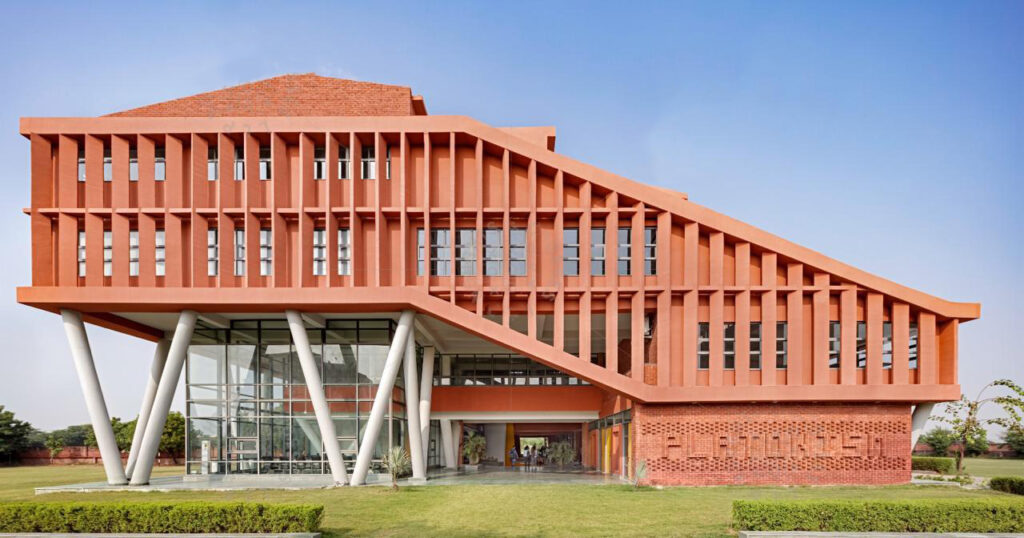
IMAGE 18 – SAITM Seminar Hall
The basic MBA syllabus in most MBA colleges in India typically includes the following subjects:

IMAGE 19 – MBA Syllabus
Foundation Courses:
Principles of Management
Business Communication
Business Economics
Financial Accounting
Quantitative Techniques for Management
Organizational Behaviour
Core Courses:
Financial Management
Marketing Management
Operations Management
Human Resource Management
Strategic Management
Management Information Systems
Business Ethics and Corporate Governance
Elective Courses:
Finance: Corporate Finance, Investment Management, Financial Derivatives.
Marketing: Consumer Behavior, Brand Management, Digital Marketing.
Operations: Supply Chain Management, Project Management, Quality Management.
Human Resources: Talent Management, Compensation and Benefits, Performance Management.
Information Technology: Business Analytics, E-commerce, Information Systems Strategy.
Capstone Projects or Internships:
Practical application of learning through projects or internships in organizations.
Soft Skills Development:
Communication Skills
Leadership Development
Teamwork and Collaboration
Negotiation Skills
Presentation Skills
MBA Average Placement Package
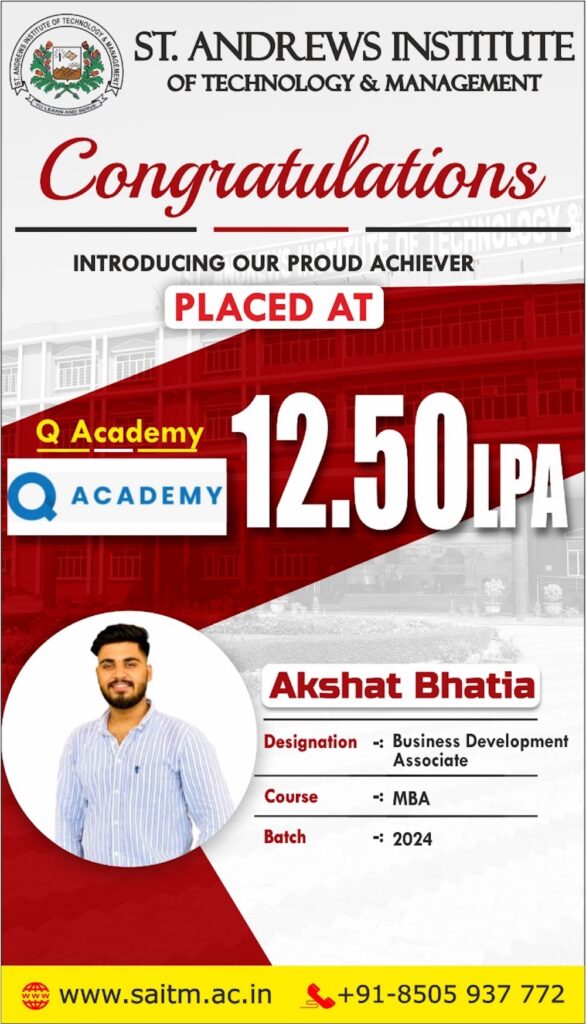
IMAGE 20 – Placement Team makes Placement easier for Freshers
Average placement package for individuals with an MBA in India can vary widely based on factors like the business schools attended, chosen specialization, work experience, industry, job role, and location. However, MBA holders in India typically earn higher salaries than those with undergraduate degrees.
Here’s an overview of the average MBA salary range in India:
Entry-Level Positions

IMAGE 21 – Planning Future
For entry-level positions, such as management trainees or associate roles, MBA graduates in India can generally expect a salary ranging from INR 4 lakhs to INR 12 lakhs per annum. However, this figure can vary depending on factors such as the industry, company size, geographic location, and the reputations of the business schools from which the MBA was obtained.
Mid-Level Positions
For mid-level positions, individuals with an MBA degree in India typically receive salaries ranging from INR 10 lakhs to INR 25 lakhs per annum. However, this salary range can be influenced by factors such as industry, company size, geographic location, and the reputation of the business schools attended by these professionals. Graduates from prestigious business schools or those with specialized skills and experience may command higher salaries, potentially exceeding the upper limit of this range.
Senior-Level Positions
As MBA aspirant progress in their careers and take on leadership roles, their salaries tend to increase significantly. Senior-level positions such as senior manager, director, and vice president can offer salaries ranging from ₹15 lakh to ₹40 lakh or more per annum, depending on the industry and company.
Top Companies that Actively Recruit MBA Graduates from Colleges
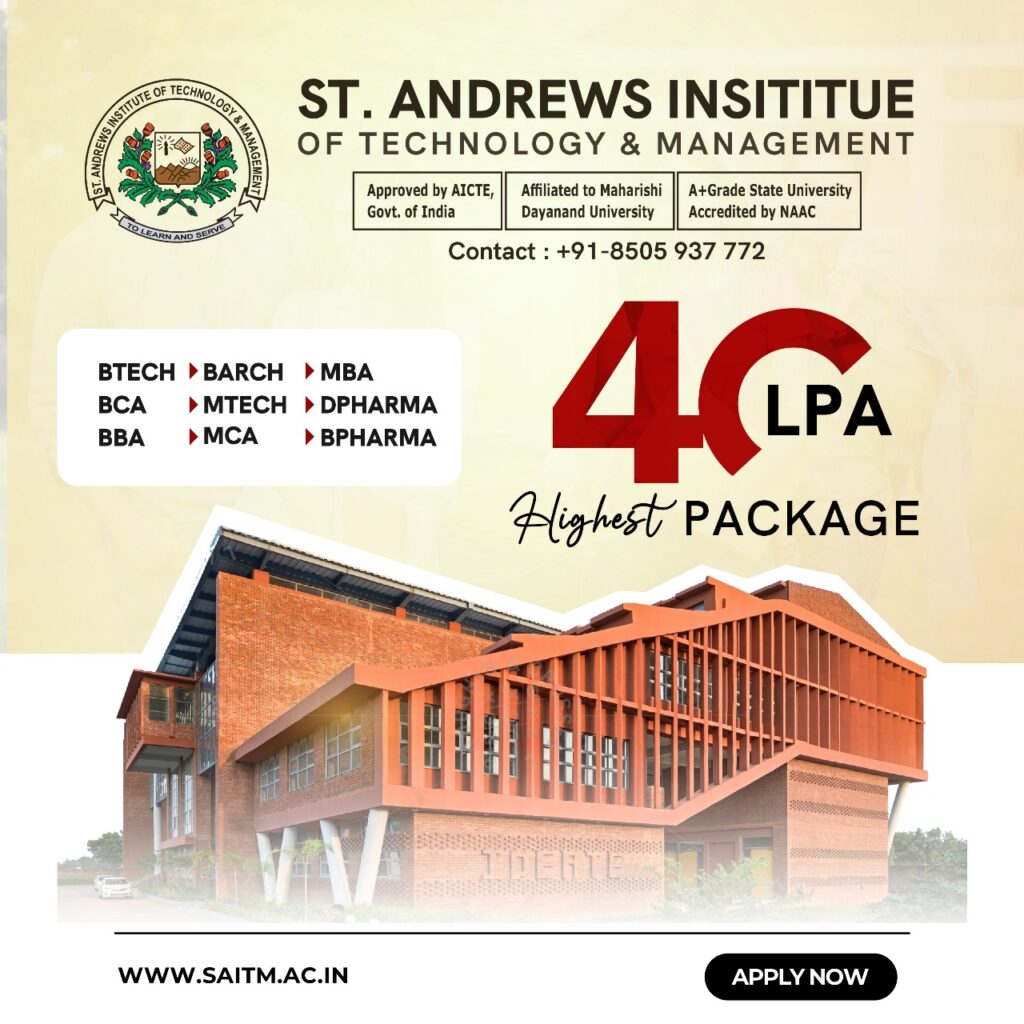
IMAGE 22 – Courses Detail
In India, several top companies actively recruit MBA graduates from MBA colleges in India. These companies seek candidates with strong business acumen, leadership skills, and a deep understanding of the Indian market.
Some of the top companies known for recruiting MBA graduates in India include:
McKinsey & Company
The Boston Consulting Group (BCG)
Bain & Company
Hindustan Unilever Limited (HUL)
Tata Consultancy Services (TCS)
Accenture
Deloitte India
KPMG India
PricewaterhouseCoopers (PwC) India
Ernst & Young (EY) India
ICICI Bank
HDFC Bank
Axis Bank
Reliance Industries Limited (RIL)
Aditya Birla Group
Top MBA Colleges in India Placements-wise
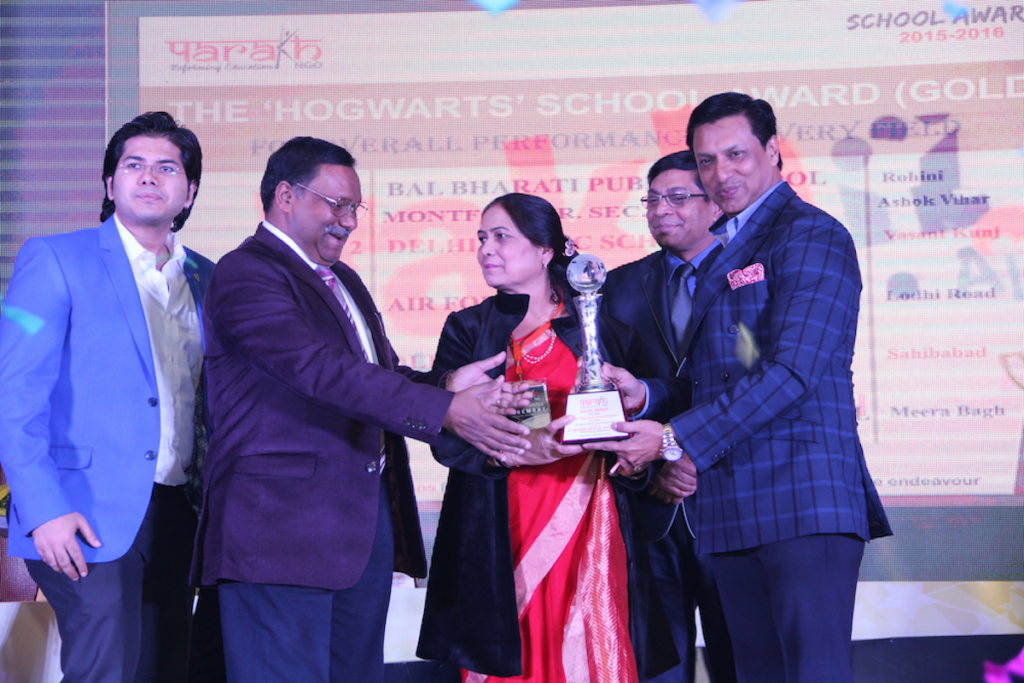
IMAGE 23 – SAITM got award of Best College
Several institutions have a strong track record of placements.
Here are some of the top MBA colleges in India known for their placements:
Indian Institute of Management (IIM)
All the Indian Institute of Management, including and others, are known for their exceptional placements. These premier institutions attract top recruiters from various sectors, offering high salary packages and diverse job profiles to students.
St. Andrews Institute of Technology and Management (SAITM):
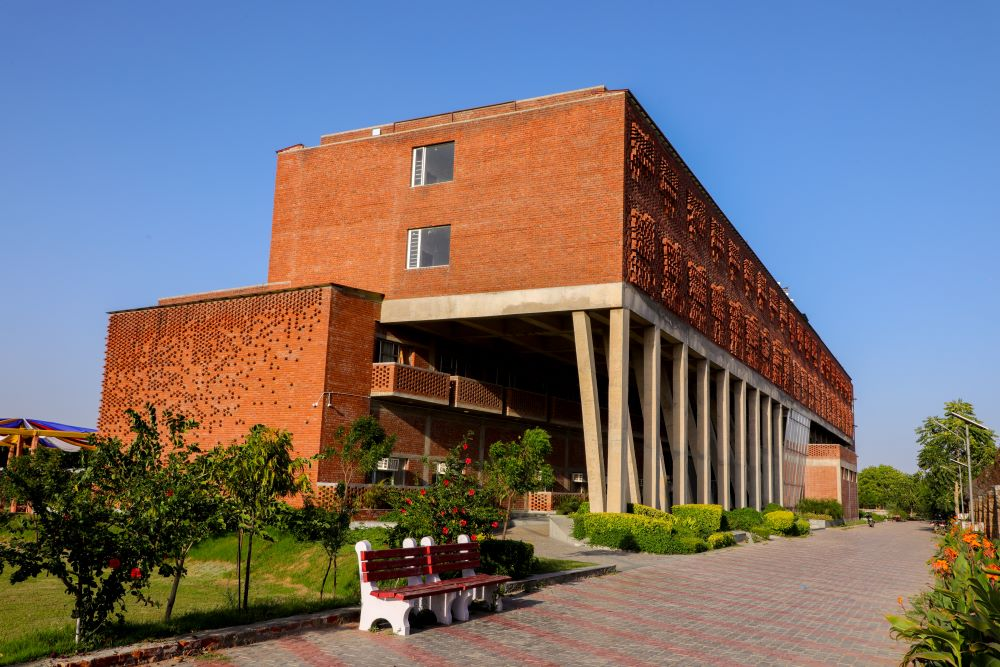
IMAGE 24 – New Block of SAITM
SAITM provides placement assistance to its MBA students by organising recruitment drives, inviting companies for campus placements, and offering career counseling services.
Faculty of Management Studies (FMS), University of Delhi:
FMS Delhi, as a government institution, has consistently achieved excellent placements. Students are placed in top companies across sectors with competitive salary packages.
Department of Management Studies (DMS), Indian Institutes of Technology (IITs):
Several IITs, like IIT Bombay, IIT Delhi, IIT Kharagpur, and others, house management departments providing diverse management programs. These institutes foster robust industry relationships and ensure successful placements for their graduates, who secure positions in renowned companies.
Xavier Labour Relations Institute (XLRI), Jamshedpur
XLRI, although a private institution, is renowned for its strong placements. It offers high salary packages and diverse job opportunities to students in sectors such as consulting, finance, marketing, and operations.
Indian Institute of Foreign Trade (IIFT), Delhi and Kolkata
IIFT, being a government institution, has a strong placement record in the field of international business and trade. Students are placed in multinational companies, global organizations, and leading Indian firms.
National Institute of Industrial Engineering (NITIE), Mumbai
NITIE, as a government institution, specializes in operations and supply chain management. It has a strong industry interface, with students securing placements in top companies in India and abroad.
Institute of Rural Management Anand (IRMA):
IRMA, being a government institution, focuses on rural management and development. It has a strong placement record, with students securing placements in sectors such as rural development, microfinance, and agribusiness.
Best ROI MBA Colleges in India
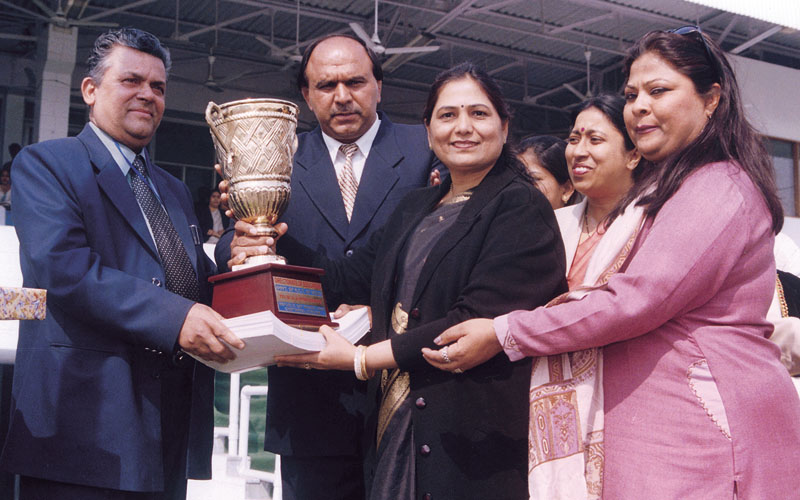
IMAGE 25 – Award for Best Management College
Several institutions offer a good return on investment (ROI) due to their reasonable fees and strong placement records.
Here are some government MBA colleges in India known for providing a good ROI:
Faculty of Management Studies (FMS), University of Delhi–
FMS Delhi is known for its low fees compared to other top B-schools and consistently high placement records, offering an excellent ROI to its students.
St. Andrews Institute of Technology and Management (SAITM), Gurgaon
The MBA program at St. Andrews Institute of Technology and Management (SAITM) in Gurgaon offers a solid educational experience with a high return on investment (ROI), facilitated by its industry-aligned curriculum, value-added modules, and strong placement records.
Jamnalal Bajaj Institute of Management Studies (JBIMS), Mumbai:
JBIMS is affiliated with the University of Mumbai and is known for its low fees and strong placement opportunities, making it a good choice for ROI-conscious students.
Department of Management Studies (DMS), Indian Institutes of Technology (IITs)
Several IITs like IIT Bombay, IIT Delhi, and IIT Kharagpur provide a range of management programs at comparatively lower fees than standalone management institutions, along with impressive placement records.
Institute of Management Studies (IMS), Banaras Hindu University (BHU), Varanasi
IMS BHU offers an MBA with reasonable fees and strong placements, particularly in sectors such as consulting, IT, and FMCG.
Institute of Rural Management Anand (IRMA)–
IRMA, being a government institution, focuses on rural management and development. It has a strong placement record, with students securing placements in sectors such as rural development, microfinance, and agribusiness.
University Business School (UBS), Panjab University, Chandigarh
UBS Chandigarh offers an MBA degree with reasonable fees and strong placements, particularly in sectors such as marketing, finance, and human resource development.
School of Management Studies (SMS), University of Hyderabad
SMS Hyderabad offers an MBA degree with affordable fees and strong placements in sectors such as IT, consulting, and research.
Department of Business Administration, Aligarh Muslim University (AMU), Aligarh
AMU offers an MBA degree with moderate fees and good placements in sectors such as finance, marketing, and human resources.
University School of Management Studies (USMS), Guru Gobind Singh Indraprastha University (GGSIPU), Delhi
USMS GGSIPU offers MBA with reasonable fees and strong placements in sectors such as IT, consulting, and e-commerce.
Top MBA Colleges in Delhi NCR

IMAGE 26 – SAITM Boys Hostel
In Delhi NCR, there are several MBA colleges that offer quality education and strong placement opportunities.
Here are some of the top MBA colleges in Delhi NCR:
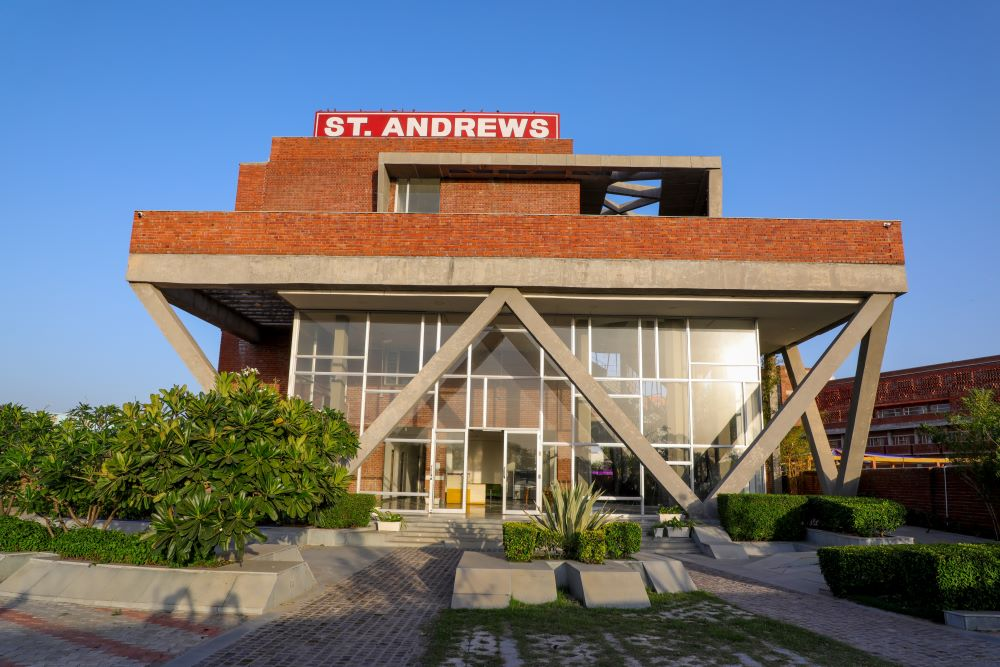
IMAGE 27 – Canteen of SAITM
Faculty of Management Studies (FMS), University of Delhi:-
FMS Delhi is one of the oldest and most prestigious management institutes in India. It offers full-time MBA and MBA-Executive programs with a focus on academic excellence, industry exposure, and placement opportunities.
St. Andrews Institute of Technology and Management, Delhi NCR
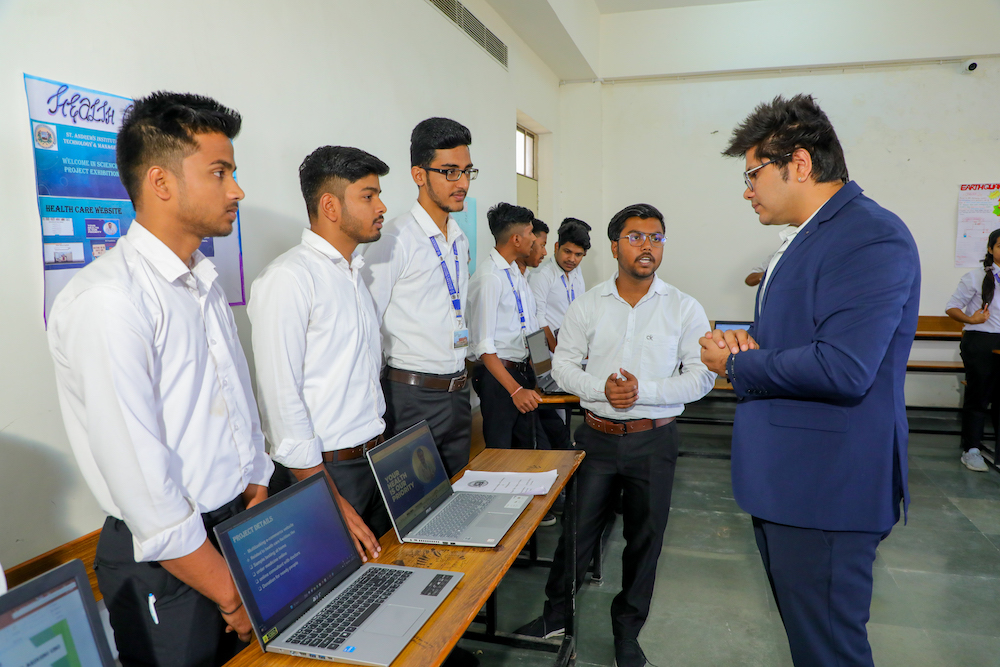
IMAGE 28 – Project Exhibition 2023
St. Andrews Institute of Technology and Management (SAITM) offers a Master of Business Administration (MBA) program aimed at providing students with a comprehensive understanding of business management principles and practices.
Department of Management Studies (DMS), Indian Institute of Technology Delhi (IITD)
DMS IIT Delhi offers a full-time MBA known for its rigorous curriculum, experienced faculty, and strong industry connections. The program emphasizes innovation, entrepreneurship, and leadership development.
Lal Bahadur Shastri Institute of Management (LBSIM), Delhi
LBSIM is a premier government management institute affiliated with Guru Gobind Singh Indraprastha University (GGSIPU). It offers full-time and part-time MBA with a focus on holistic development and industry relevance.
University School of Management Studies (USMS), Guru Gobind Singh Indraprastha University (GGSIPU), Delhi:
USMS GGSIPU offers MBA course with various specializations, providing students with a blend of theoretical knowledge and practical skills required for managerial roles.
Department of Financial Studies (DFS), University of Delhi
DFS Delhi offers MBA in Financial Management, focusing on finance and related domains. The program equips students with the necessary skills and knowledge for careers in finance, banking, and related sectors.
Delhi School of Management (DSM), Delhi Technological University (DTU)
DSM DTU offers MBA known for its industry-oriented curriculum, experienced faculty, and strong corporate connections. The program prepares students for leadership roles in diverse sectors.
Delhi Institute of Advanced Studies (DIAS), Delhi
DIAS offers MBA affiliated with Guru Gobind Singh Indraprastha University (GGSIPU). The institute focuses on providing excellent education, industry exposure, and placement opportunities to its students.
Maharaja Agrasen Institute of Management Studies (MAIMS), Delhi
MAIMS offers MBA with a focus on practical learning, industry internships, and placement assistance. The institute emphasizes holistic development and prepares students for managerial roles.
Guru Nanak Institute of Management Studies (GNIMS), Delhi
GNIMS offers MBA affiliated with Guru Gobind Singh Indraprastha University (GGSIPU). The institute focuses on providing a conducive learning environment, industry exposure, and placement support to its students.
Banarsidas Chandiwala Institute of Professional Studies (BCIPS), Delhi
BCIPS offers an MBA program with a focus on experiential learning, industry projects, and soft skills development. The institute strives to groom competent professionals capable of meeting industry challenges.
IIM – Indian Institute of Management
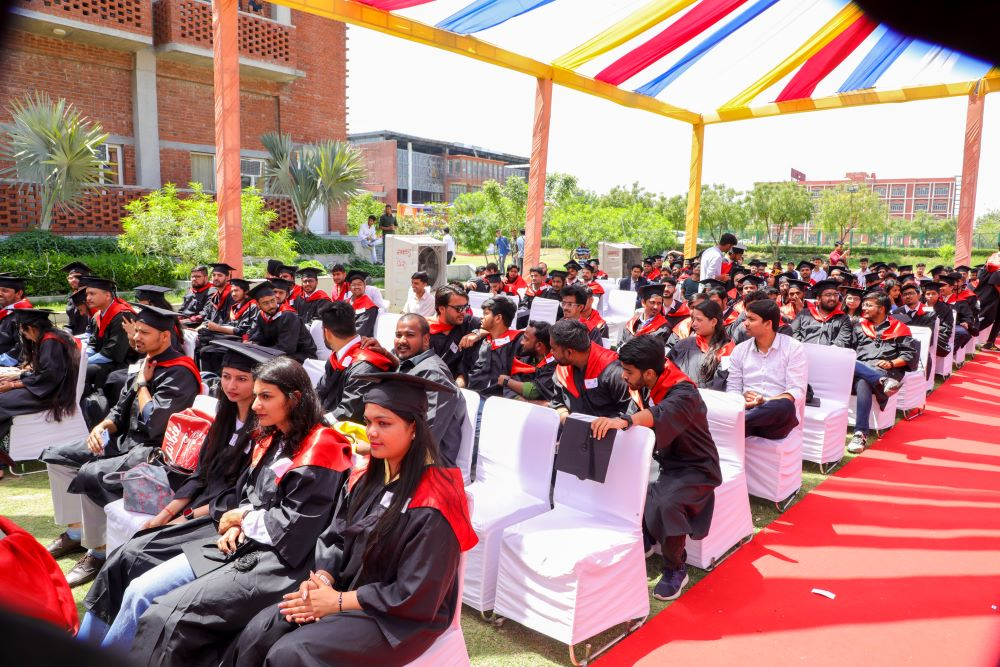
IMAGE 29 – Convocation 2023
Pursuing an MBA from the Indian Institute of Management (IIMs) is considered highly prestigious due to their rigorous academic curriculum, experienced faculty, strong industry connections, and excellent placement opportunities.
Here are some key points about pursuing an MBA from Indian Institute of Management (IIMs):
Reputation
IIMs are globally recognized for their academic excellence and are consistently ranked among the top management institutes worldwide.
Academic Curriculum
MBA course offered by IIMs are designed to provide a comprehensive understanding of various business domains such as finance, marketing, operations, human resources, and strategy. The curriculum is regularly updated to reflect industry trends and requirements.
Faculty
IIMs boast renowned faculty members who are experts in their respective fields. They bring a wealth of industry experience and academic expertise to the classroom, enriching the learning experience for students.
Industry Exposure
Indian Institute of Management (IIMs) have strong ties with corporate organizations, which facilitate industry interactions, guest lectures, workshops, and internships. This exposure allows students to gain practical insights into real-world business challenges and opportunities.
Placements
IIMs have a stellar track record of placements, with students securing lucrative job offers from top companies in India and abroad. The placement process is highly competitive, and recruiters actively seek out IIM graduates for their leadership potential and analytical skills.
Alumni Network
Graduating from an IIM provides access to a vast network of alumni who occupy leadership positions in diverse industries worldwide. The alumni network offers mentorship, networking opportunities, and career guidance to current students and graduates.
Entrepreneurship Support
Many IIMs have incubation centers and entrepreneurship cells that support aspiring entrepreneurs in launching and scaling their ventures. These initiatives provide funding, mentorship, and networking opportunities to budding entrepreneurs.
Global Exposure:
Some IIMs offer international exchange programs and collaborations with leading business schools worldwide, providing students with opportunities for cross-cultural learning and global exposure.
IMT – Institute of Management Technology
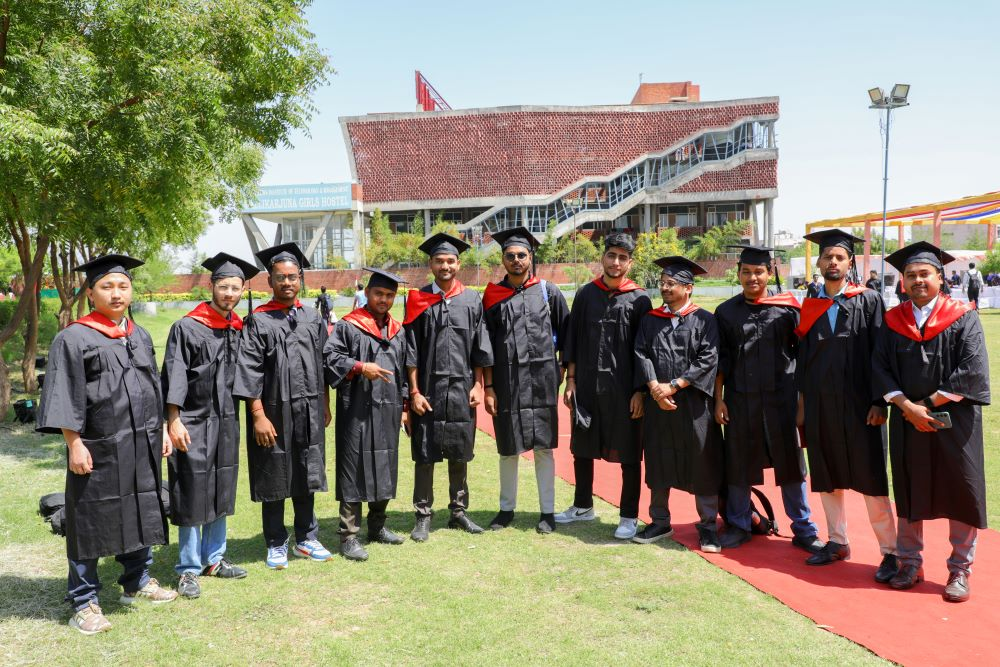
IMAGE 30 – Convocation at SAITM
Pursuing an MBA from the Institute of Management Technology (IMT) offers several advantages and opportunities for professional growth.
Here are some key points about pursuing an MBA from IMT:
Reputation:
IMT is a premier business school in India with a strong reputation for academic excellence, industry relevance, and innovation. It is consistently ranked among the top Business schools in the country by various ranking agencies.
Diverse Programs
IMT offers a wide range of MBA specialization, including full-time MBA, Executive MBA, and PGDM programs with various specializations. This allows students to choose a program that aligns with their career goals and interests.
Curriculum
MBA at IMT are designed to provide a comprehensive understanding of business fundamentals, strategic management, leadership skills, and industry-specific knowledge. The curriculum is regularly updated to keep pace with industry trends and demands.
Faculty:
IMT boasts a faculty of experienced professors, industry practitioners, and thought leaders who bring a wealth of knowledge and expertise to the classroom. They engage students through interactive teaching methods, case studies, and real-world projects.
Industry Connect
IMT has strong ties with corporate organizations, which facilitate industry interactions, guest lectures, internships, and placement opportunities for students. This exposure allows students to gain practical insights into real-world business challenges and opportunities.
Placements–
IMT has an impressive track record of placements, with students securing job offers from top companies across various sectors. The placement process is facilitated by the institute’s dedicated placement cell, which provides career guidance, skill development workshops, and networking opportunities.
Global Exposure–
IMT offers international exchange programs, collaborations with leading business schools worldwide, and opportunities for global internships and projects. This exposure allows students to gain cross-cultural competence and expand their professional network globally.
Entrepreneurship Support:
IMT has entrepreneurship development cells and incubation centers that support aspiring entrepreneurs in launching and scaling their ventures. These initiatives provide mentoring, funding, and networking opportunities to budding entrepreneurs.
SAITM – St. Andrews Institute of Technology and Management
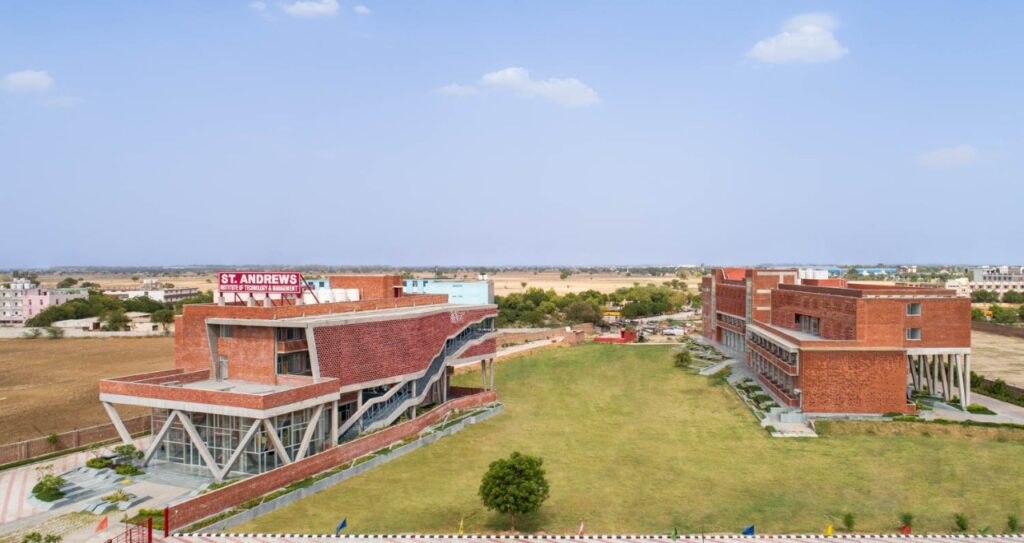
IMAGE 31 – SAITM Campus Overview
St. Andrews Institute of Technology and Management (SAITM) offers a variety of programs that impart a comprehensive understanding of management principles, leadership skills, and industry-specific knowledge.
Here are some key points about pursuing an MBA from SAITM:
Academic Excellence
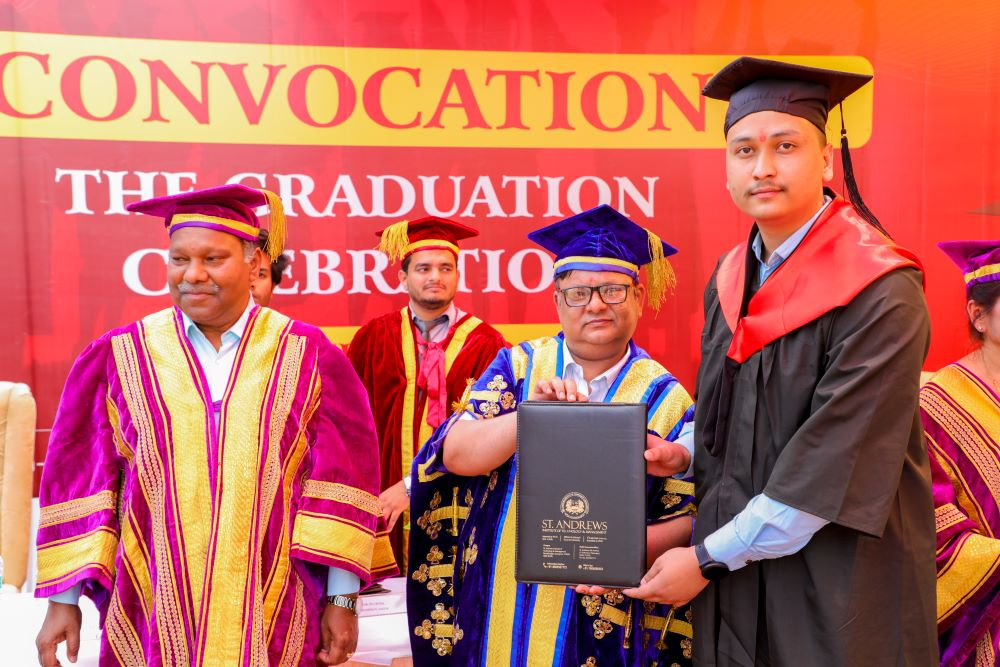
IMAGE 32 – Convocation of Batch 2022
SAITM’s MBA is designed to offer a rigorous academic curriculum covering various aspects of business management, including finance, marketing, human resources, operations, and strategy.
Industry-Relevant Curriculum
The MBA curriculum at SAITM is regularly updated to reflect current industry trends and demands. It incorporates case studies, industry projects, and practical learning experiences to prepare students for real-world challenges.
Experienced Faculty
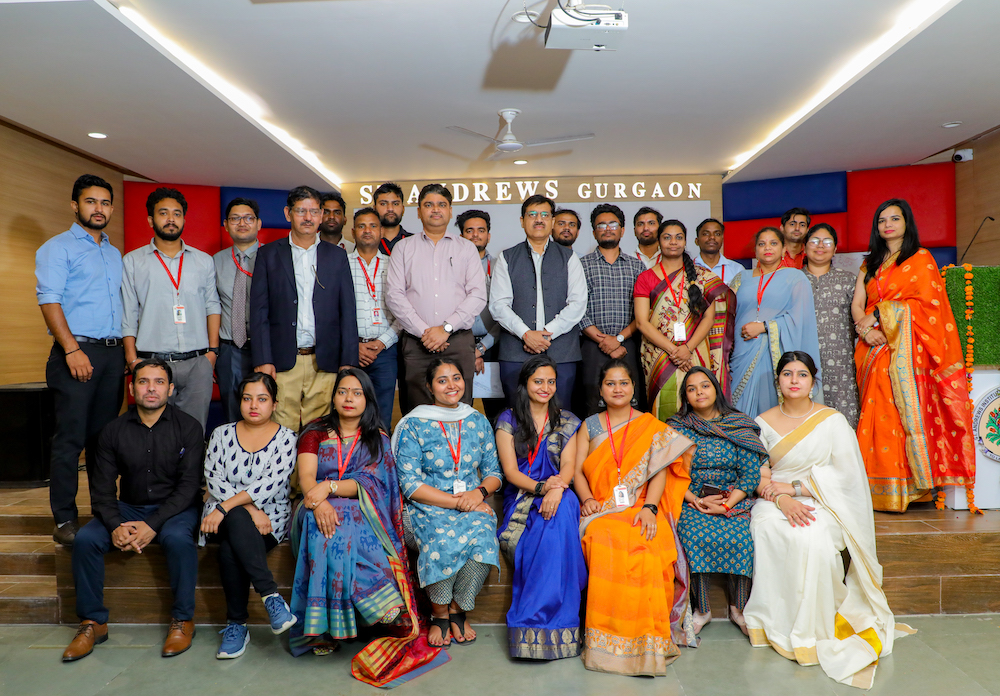
IMAGE 33 – SAITM Faculty
SAITM boasts a team of experienced faculty members who are experts in their respective fields. They bring a wealth of industry experience and academic knowledge to the classroom, enriching the learning experience for students.
Industry Exposure:
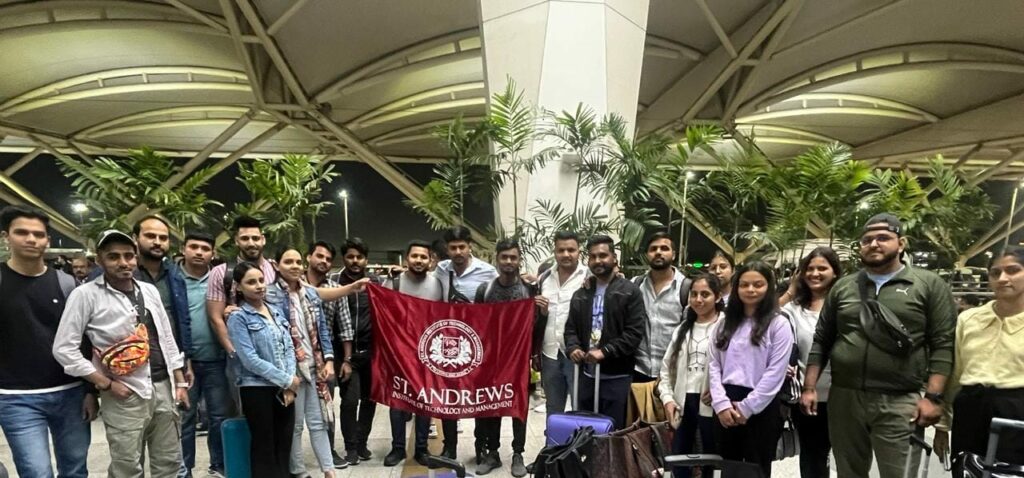
IMAGE 34 – International (DUBAI) Industry visit for MBA Students
SAITM provides students with opportunities for industry interactions, guest lectures, workshops, and internships to gain practical insights into various business domains. This exposure helps students develop critical thinking, problem-solving, and decision-making skills.
Placement Assistance
SAITM has a dedicated placement cell that assists students in securing internships and placements in reputed companies. The placement cell organizes recruitment drives, industry connect sessions, and skill development workshops to enhance students’ employability.
Entrepreneurship Support–
SAITM encourages entrepreneurship among its students by providing support through entrepreneurship development cells, incubation centers, and startup funding initiatives. Students have the opportunity to develop business ideas, launch ventures, and receive mentorship from industry experts.
State-of-the-Art Infrastructure
SAITM offers modern infrastructure and facilities, including well-equipped classrooms, libraries, computer labs, and recreational areas, to create a conducive learning environment for students.
Alumni Network:
SAITM has a strong network of alumni who occupy leadership positions in various industries. Alumni provide mentorship, networking opportunities, and career guidance to current students, helping them build successful careers in their chosen fields.
ISB – Indian School of Business
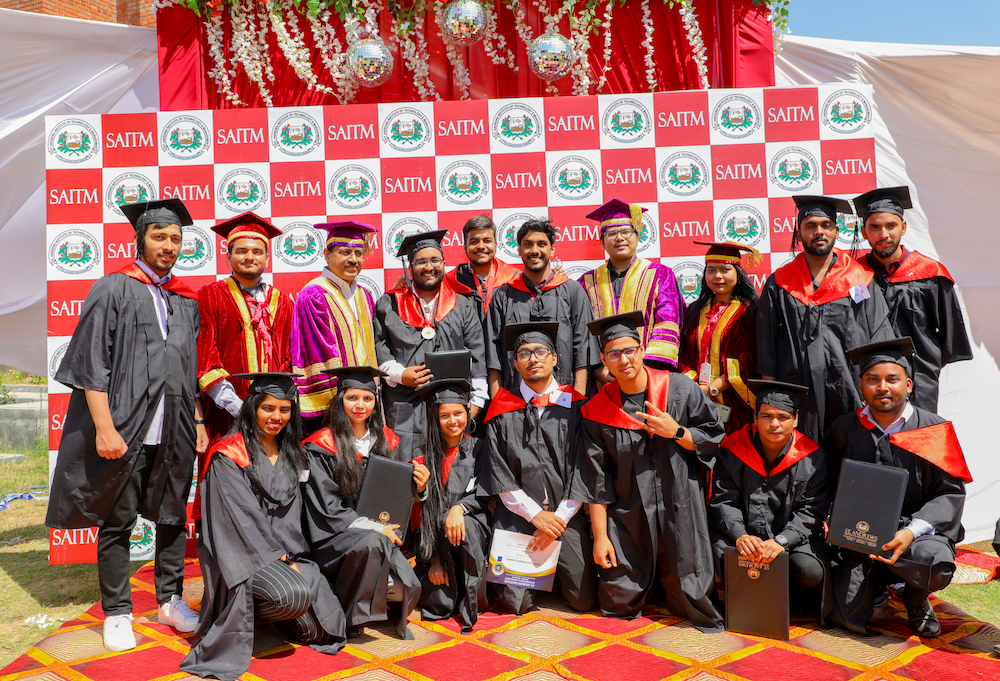
IMAGE 35 – Degree Distribution at SAITM 2023
The Indian School of Business (ISB) offers a highly prestigious and globally recognized MBA program.
Here are some key points about the ISB MBA:
Reputation–
ISB is recognized as one of the top business schools in India and is globally renowned for its MBA program. It is consistently ranked among the best business schools in the world by various ranking agencies.
One-Year Program
The ISB MBA is a one-year, full-time residential program designed for experienced professionals with a minimum of two years of work experience. The condensed format allows students to accelerate their career progression without taking a long break from their professional lives.
Academic Excellence:
The curriculum at ISB is rigorous and comprehensive, covering a wide range of business topics such as finance, marketing, operations, strategy, entrepreneurship, and leadership. The program emphasizes experiential learning, case studies, and industry projects to develop practical skills and knowledge.
World-Class Faculty
ISB boasts a diverse faculty comprising experienced professors, industry practitioners, and thought leaders from around the world. They bring a wealth of academic expertise and real-world experience to the classroom, enriching the learning experience for students.
Global Exposure
ISB offers international exchange programs and collaborations with leading business schools worldwide, providing students with opportunities for cross-cultural learning, networking, and global career opportunities.
Industry Connections
ISB has strong ties with corporate organizations, which facilitate industry interactions, guest lectures, workshops, and internships for students. The institute’s extensive alumni network also provides valuable connections and mentorship opportunities.
Career Services
ISB’s Career Advancement Services (CAS) team provides personalized career coaching, workshops, networking events, and recruitment assistance to help students achieve their career goals. The team works closely with recruiters to facilitate job placements for ISB graduates.
Entrepreneurship Support;
ISB has a dedicated entrepreneurship cell and incubation center that support aspiring entrepreneurs in launching and scaling their ventures. The institute provides mentorship, funding, and networking opportunities to help students turn their business ideas into successful ventures.
FMS DU – Faculty of Management Studies, University of Delhi
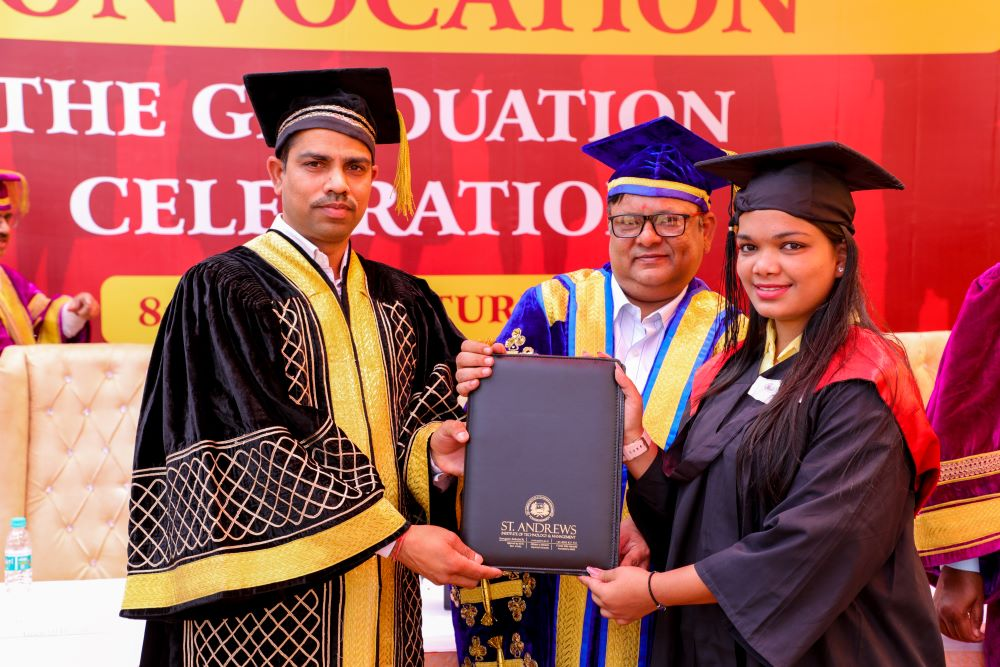
IMAGE 36 – Event of Degree Distribution at SAITM 2023
The Faculty of Management Studies (FMS), University of Delhi, is one of the oldest and most prestigious management institutes in India.
Here are some key points about FMS DU:
Reputation;
FMS Delhi is renowned for its academic excellence, industry relevance, and strong alumni network. It is consistently ranked among the top management institutes in India and globally.
History
Established in 1954, FMS Delhi is one of the first management institutes in India and has a rich legacy of producing business leaders, entrepreneurs, and policymakers.
Full-Time MBA Program
FMS offers a full-time MBA program, known for its rigorous academic curriculum, experienced faculty, and practical learning approach.
Affordable Fees
FMS Delhi is known for its relatively low tuition fees compared to those of other top B-schools in India, rendering it an attractive option for students seeking quality education at an affordable cost.
Industry Connections:
FMS has strong ties with corporate organizations, which facilitate industry interactions, guest lectures, workshops, and internships for students. The institute’s extensive alumni network also provides valuable connections and mentorship opportunities.
Placements:
FMS Delhi has an impressive track record of placements, with students securing job offers from top companies across various sectors. The institute’s dedicated placement cell works closely with recruiters to facilitate job placements for students.
Entrepreneurship Support:-
FMS encourages entrepreneurship among its students and provides support through entrepreneurship development cells, incubation centers, and startup funding initiatives. Students have the opportunity to develop business ideas, launch ventures, and receive mentorship from industry experts.
Alumni Network–
FMS has a strong network of alumni who occupy leadership positions in various industries worldwide. Alumni provide mentorship, networking opportunities, and career guidance to current students, helping them build successful careers in their chosen fields.
FAQs
What is the eligibility criteria for different MBA courses in India?
Typically, candidates must have a bachelor’s degree in any discipline from a recognized university. Additionally, some institutes may require a certain minimum score in entrance exams like CAT, MAT, XAT, etc.
What are the different specializations offered in different MBA courses?
Specializations vary among institutions but commonly include Finance, Marketing, Human Resources, Operations Management, Information Technology, International Business, etc.
What is the duration of different MBA courses in India?
MBA courses generally span two years, divided into four semesters. However, some institutes may offer one-year executive MBA courses for experienced professionals.
What are the top MBA colleges in India?
There are several prestigious top MBA colleges in India including the Indian Institute of Management (IIMs), Indian School of Business (ISB), XLRI Jamshedpur, Faculty of Management Studies (FMS), and others. Rankings may vary based on different parameters.
What is the basic admission process to MBA College?
The admission process typically includes clearing the entrance exam (CAT, MAT, XAT, etc.), followed by group discussions, personal interviews, and sometimes written ability tests.
Is MBA worth it from Private MBA Colleges or Government MBA Colleges in India?
Both offer distinct advantages: private MBA colleges often provide industry connections and flexibility, while government MBA colleges offer prestigious alumni networks and lower tuition fees.
What is the average cost of pursuing an MBA in India?
The cost varies depending on the institute, with fees ranging from a few lakhs to several lakhs of rupees. Additionally, living expenses should be considered, especially for those studying in cities like Mumbai, Delhi, Bangalore, etc.
What is the placement scenario for MBA graduates in India?
Placement opportunities vary depending on factors like institute reputation, specialization, and individual skills. Top institutes often attract lucrative job offers from leading companies, both domestic and international.
Are there scholarships available for MBA students in India?
Yes, many institutes offer scholarships based on merit, need, or specific criteria. Additionally, there are government schemes and private organizations that provide financial assistance to deserving candidates.
What are the key skills required to succeed in an MBA program?
Strong analytical and problem-solving abilities, effective communication skills, leadership qualities, adaptability, and a strategic mindset are some of the essential skills for MBA students.
Can international students apply for different MBA courses in India?
Yes, many top MBA colleges in India welcome applications from international students.
What are benefits of pursuing an MBA after a B.Tech?
Pursuing an MBA after a B.Tech can broaden career opportunities, enhance leadership and management skills, provide a deeper understanding of business principles, increase earning potential, and facilitate career transitions into roles such as consulting, entrepreneurship, and senior management.
Can I do MBA without CAT?
Yes, you can pursue an MBA without taking the CAT . Many business schools in India accept other entrance exams like MAT (Management Aptitude Test), XAT (Xavier Aptitude Test), and CMAT (Common Management Admission Test) for admission to their different MBA courses.
Additionally, some institutes conduct their own entrance exams or consider other criteria such as academic performance and work experience for admission.
Is MBA in Business Analytics good?
This specialized program equips students with a blend of business acumen and analytical skills, preparing them to tackle complex challenges in today’s data-driven world. Industries across various sectors, including finance, marketing, healthcare, and technology, increasingly rely on analytics to drive innovation and gain a competitive edge.

